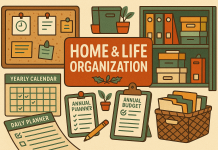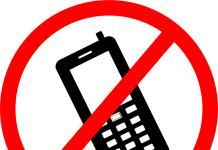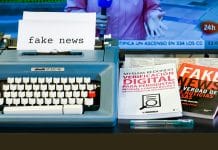Your home office is a breeding ground for paper.
It seems to multiply overnight causing the piles to close in around you.
It doesn’t have to be this way. I will share with you my learned insight about paper clutter. I’m a fan of Professional Organizers, Peter Walsh and Marie Kondo. I use some of their tips as well as my own for maintaining my home office.
Let’s start with Marie Kondo’s philosophy, her “basic principle for sorting papers is to throw them all away. There is nothing more annoying than paper.” I love this though I don’t think it’s all together practical or possible.
In Kondo’s book, The Life-Changing Magic of Tidying Up, she tells us what that really means. She sorts her paperwork into three categories; currently in use, needed for a limited period of time and keep indefinitely. The first two categories call for action and should be cleared out regularly i.e. throw it all away. If the action pile is full, there is something in your life that’s undone (Kondo). Indefinitely documents include insurance policies, leases, identifications, etc. Everything else can be trashed like credit card statements, used check books, and paystubs. When filing does occur, Kondo suggests sorting by infrequently used and frequently used documents.
It’s all about keeping it simple, which is a philosophy I strive for. I do try to toss as much of our paper as possible, but I also have learned from the traditional way of filing paper, much like Peter Walsh’s strategy.
In the book, It’s All Too Much, Walsh starts with the vision of how you and your family would like the home office to function. First, decide what activities will take place and remove anything that doesn’t belong in the office. Second, focus on what remains.
Your Desk and Chair
- Find the right fit for your space and body.
- Listen to your body; it will tell you if something is too high, too low. Adjust accordingly to avoid injury or strain.
- Clear surfaces daily. You can’t do work if there isn’t a place to do it.
Your Filing Cabinet
- It’s a good place to store documents but resist the urge to file everything!
- I recommend placing your filing cabinet on your dominant hand side i.e. if you’re right handed; keep it on the right of your desk/chair.
- File paper at least weekly.
- Don’t get too creative with file names. It will be harder to remember what they are when you go to retrieve a document.
- Use broad categories like Automotive, Financial, Health, Home, etc.
- Keep frequently used documents in the top drawer and less used items in the bottom.
- Cull your files annually (Walsh). Schedule it on your calendar.
Your Paper
- Assign a home for the mail; there should only be one zone, which should include Action Items like forms and bill pay. Make life easier by having envelopes, stamps and checkbook with reach.
- Purge junk mail immediately. If you pick-up from P.O. Box, purge before leaving the post office. Don’t let it into the house!
- Sign up to stop junk mail.
- Keep a shredder handy for confidential papers. I have a burn bin for ours; it’s right next to our wood stove.
- File statements immediately
- Only action items remain to be completed within two days
Monthly Bills
- Consider e-statements and auto-pay
- Purge all previous bill stubs non-work related.
- Keep only current month to pay
- File in folder called “Bills to Pay”
- Schedule time to pay them on electronic calendar
- Purge once paid or once new bill comes in
Bank Statements
- Consider e-statements
- Purge monthly statement once new statement arrives or collect all current year monthly statements and purge once end-of-year statement is received
- Only keep 7 years worth of year end statements
Taxes
- Organize Year Round
- Create an easily accessible folder for the current year. Add each document as it’s received. It’s a lot easier than searching for documents when you need to start.
- Decide How You Will File
- Will you do your own taxes or hire a professional? Make an appointment today! Paper vs. Electronic.
- Start Early
- As soon as you get all your documentation, start your taxes. Avoid stress of an approaching deadline.
- Storing Your Completed Tax Returns
- Kraft envelopes will contain all those small pieces.
- You should have at least one envelope per year. If your documentation won’t fit, divide it into two: 1) Income 2) Deductions.
Important Keep Forever Documents
- Store in a fire proof safe or safe deposit. In case of an emergency, extended power outage or regrettably death, all our information is in one place. Be sure you and your spouse are aware of its location and inform at least one trusted friend or family member as well.
- Social Security Cards, Birth Certificates and Passports for each person in your family
- Copy of Advanced Directives for each spouse. Vermont residents- Create yours today at Vermont Ethics Network
- Last Will and Testament of each spouse
- Life Insurance account information for each spouse
- Update life insurance in the event of a birth, death, divorce or decade
- Only keep current policy; purge and replace when new policy arrives
- Certificate of Title of each car owned
- Marriage/Divorce certificates
- Adoption/Immigration papers
- Pension Plan
- House deed/mortgage documents
- Account Tracker printable
- Phone Directory printable
- Wallet Content printable
- Medication Information printable
- Extra cash
Product Manuals
- Trash them; most are found online
Seminar Handouts
- Trash it. You will unlikely re-study the material.
- Kondo says, “if the content is not put into practice, such courses are meaningless.” Why keep it?
- I believe we will only put a few lessons learned from seminars into practice and these usually happen right away.
Receipts/Cancelled Checks (non-work related)
- Shred or Trash
- Only keep if you’re planning to return an item
Digitize Documents
- Scan and save all Important Keep Forever Documents for reference if lost or stolen
- Scan and save tax documents as statements/receipts come in and federal and state returns
- Any document (listed above) to keep can be scanned and saved
- Purge when replacement document arrives
- Begin scanning current documents then work backwards
- Schedule time to scan old documents
I realize this is a long list and may seem overwhelming. I suggest starting with small successes rather than tackling your office all at once. Start with clearing your desk and concentrate on keeping it clear daily then move on to another challenge. It took time to accumulate the clutter; it will take time to remove it. Good luck! And remember Simply Planned can help when it seems like too much on your own.















What a great article! Very simple, practical tips especially about “keep forever” documents.